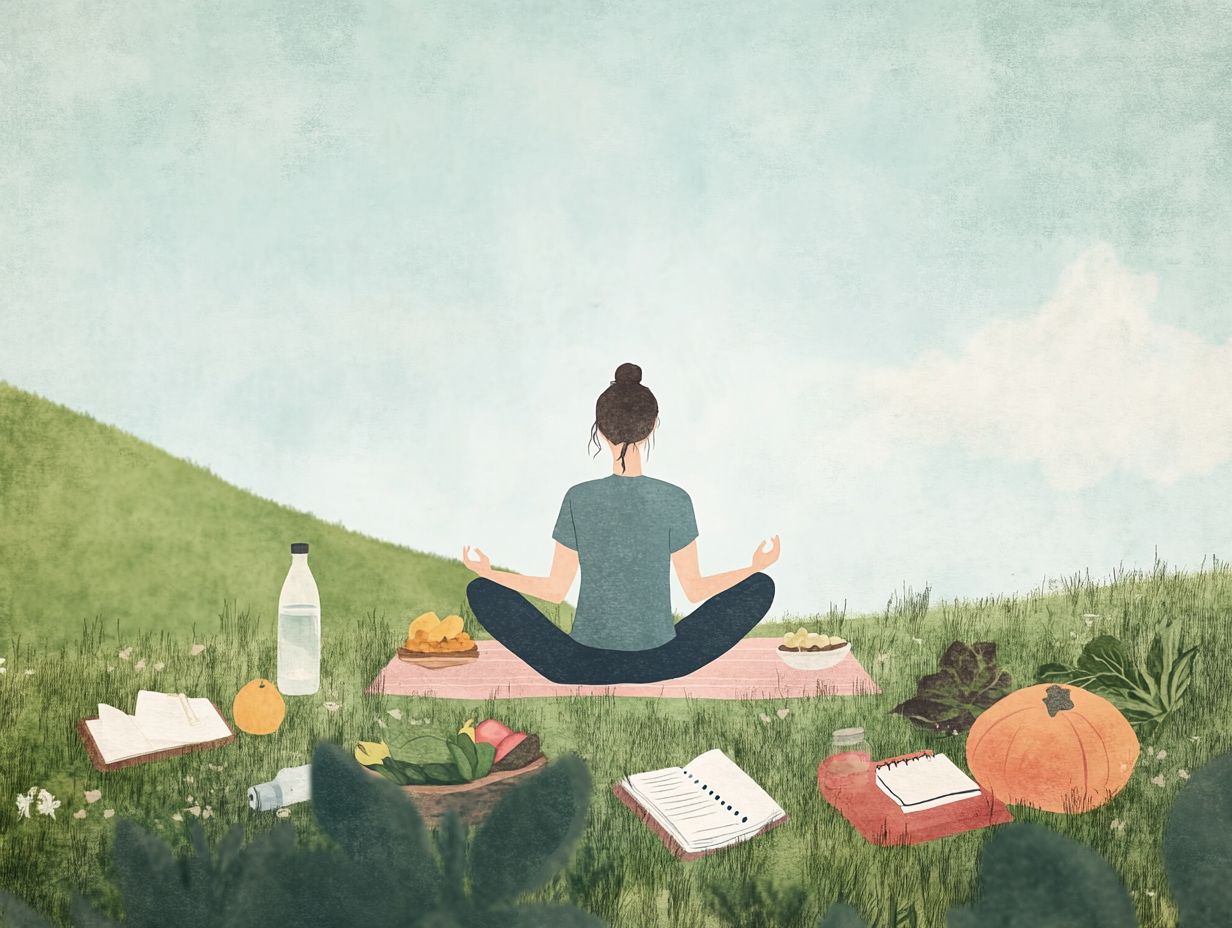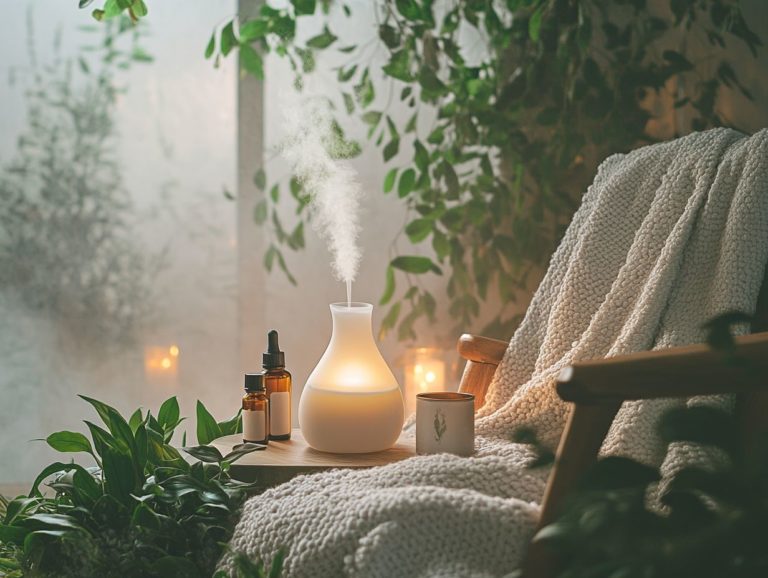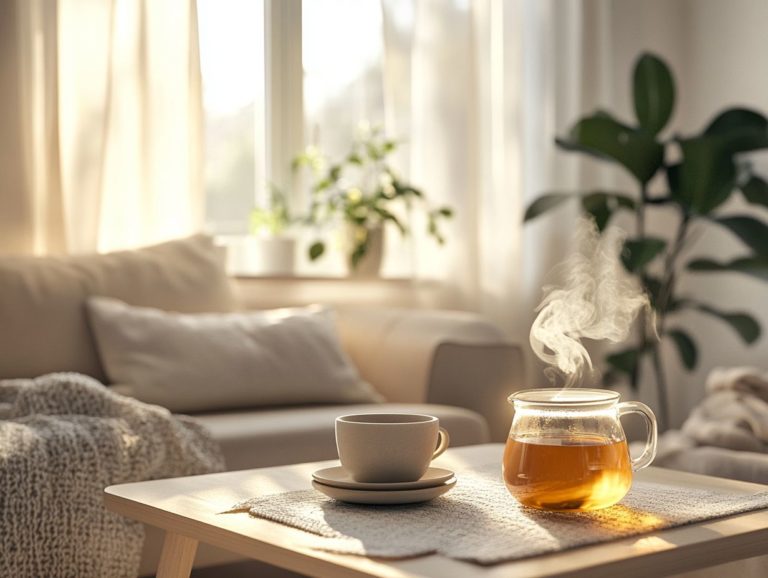5 Positive Lifestyle Changes to Reduce Anxiety
Anxiety can be an overwhelming challenge, affecting various facets of your daily life. However, there’s hope in making positive lifestyle changes that can significantly lessen its hold on you.
This article delves into five practical strategies that can empower you to reclaim control over your anxiety, such as incorporating regular exercise and practicing mindfulness.
It explores the different types of anxiety, emphasizes the importance of quality sleep and stress management, highlights the benefits of a supportive network, and shows how therapy and medication can work harmoniously with these lifestyle adjustments.
Start your journey to a calmer life today!
Contents
- Key Takeaways:
- 1. Boost Your Mood with Regular Exercise
- 2. Practice Mindfulness and Meditation
- 3. Get Enough Quality Sleep
- 4. Limit Caffeine and Alcohol Intake
- 5. Build a Support Network
- What Is Anxiety and How Does It Affect Daily Life?
- Frequently Asked Questions
- What are 5 positive lifestyle changes to reduce anxiety?
- How does exercise help in reducing anxiety?
- What are some examples of healthy eating habits for reducing anxiety?
- How can mindfulness help in reducing anxiety?
- Why is good sleep hygiene important in managing anxiety?
- How can social support play a role in reducing anxiety?
Key Takeaways:

- Regular exercise can positively impact mental health, improve emotional well-being, and reduce anxiety by releasing chemicals in the brain that make you feel good and reducing stress hormones.
- Mindfulness and meditation can help decrease anxiety symptoms by promoting relaxation and increasing self-awareness.
- Getting enough quality sleep is crucial for managing anxiety, as it helps regulate emotions and reduces fatigue and irritability.
1. Boost Your Mood with Regular Exercise
Make regular exercise a part of your life to boost your mental health and emotional well-being, particularly in a world increasingly affected by anxiety and depression, especially after the COVID-19 pandemic.
Engaging in physical activity not only boosts your overall health but also serves as an effective method for managing stress, facilitating the release of chemicals in the brain that make you feel good, and promoting a healthier lifestyle.
Aerobic exercises like running, cycling, and swimming are remarkably effective at elevating your mood and reducing symptoms of anxiety and depression. Studies reveal that committing to just 150 minutes of moderate-intensity aerobic activity each week can lead to a significant decrease in depression rates, with research suggesting a 20-30% improvement in mood-related symptoms.
Strength training also deserves a mention; it s been linked to lower feelings of anxiety and stress, offering a sense of accomplishment that enhances your self-esteem. Don t overlook outdoor activities they improve your physical well-being and connect you with nature, providing a tremendous boost for your emotional health.
By integrating these exercises into a comprehensive wellness regimen along with mindfulness practices, you can cultivate a balanced approach that nurtures not just a healthier body but also a more resilient mind.
2. Practice Mindfulness and Meditation
Practicing mindfulness and meditation can significantly elevate your emotional well-being. These practices provide effective tools for stress relief and anxiety management, particularly during challenging times like the COVID-19 pandemic.
Techniques such as deep breathing and focused meditation empower you to regain control over your thoughts and emotions, nurturing a tranquil state of mind.
Incorporating various mindfulness practices, including guided imagery and body scans, can deepen this sense of calm. Guided imagery allows you to visualize serene landscapes, whisking you away from the daily grind, while body scans cultivate awareness of your physical sensations, promoting relaxation and grounding.
Engaging in focused breathing exercises adds another layer of support, encouraging a harmonious connection between your mind and body by syncing your breath with your thoughts.
By integrating these techniques into your daily routine, you may find yourself better equipped to handle stressors, leading to long-term benefits such as improved mental clarity, emotional resilience, and a more balanced life overall.
3. Get Enough Quality Sleep
Getting enough quality sleep is crucial for your overall health and mental well-being. When you skimp on sleep, it can amplify issues like anxiety and depression.
The quality of your sleep directly impacts your ability to manage stress, your cognitive function, and your emotional stability. This makes sleep an essential part of a healthy lifestyle.
During sleep, your body undergoes essential physiological processes, such as memory consolidation. Memory consolidation is the process by which your brain organizes and stores memories during sleep, making it easier to recall information later. Additionally, your body regulates hormones during sleep, which plays a vital role in emotional regulation and building resilience against stressors.
To elevate your sleep quality, consider establishing a consistent sleep routine that signals to your body when it s time to relax. Crafting a restful environment by minimizing noise, keeping the room dark, and maintaining a comfortable temperature can significantly enhance your sleeping experience.
Avoiding stimulants like caffeine and electronic devices before bedtime helps you achieve deeper sleep.
4. Limit Caffeine and Alcohol Intake

Limiting your caffeine and alcohol intake can significantly enhance your emotional well-being and reduce symptoms of anxiety and depression. This lifestyle change is vital in today s fast-paced world.
High caffeine consumption and excessive alcohol use are linked to increased stress levels and disrupted sleep patterns, both of which can adversely impact your mental health.
These substances can amplify feelings of restlessness and irritability, making it challenging for you to maintain a balanced mood.
If you re looking to boost your emotional resilience, consider gradually cutting back on caffeine and opting for herbal teas or decaffeinated options as substitutes.
Swap alcoholic beverages for non-alcoholic alternatives, like sparkling water with a splash of fruit juice. This can keep you hydrated without the mood swings that often accompany alcohol.
Engaging in regular physical activity, practicing mindfulness, and ensuring you get enough sleep will also contribute to a healthier mental state and foster a more balanced emotional environment.
5. Build a Support Network
Creating a support network can greatly enhance your emotional well-being and effectively manage stress, anxiety, and depression. A strong circle of family, friends, and mental health professionals can offer invaluable resources, encouragement, and understanding.
These connections act as a lifeline, helping you feel less isolated and more understood in your struggles. Nurturing these relationships is crucial!
Support groups can also provide a sense of community, allowing you to connect with others facing similar challenges. Mental health professionals and professional counseling offer expert guidance tailored to your unique needs.
Together, these strategies bridge gaps in your social support and foster resilience, giving you the power to help you navigate your mental health journey with greater efficacy.
What Is Anxiety and How Does It Affect Daily Life?
Anxiety is a psychological condition that manifests as excessive worry and fear. It significantly impacts your daily life especially in today s fast-paced world and amid recent global events like COVID-19.
You may feel its effects through various symptoms that can disrupt your mental health, emotional well-being, and even your body s stress response. This creates challenges in relationships, work, and overall health.
This condition often brings together physiological responses, such as an increased heart rate and muscle tension, with psychological effects like excessive rumination and avoidance behavior.
In recent years, anxiety has surged alarmingly, fueled by the uncertainties of the pandemic. Heightened stress levels have been reported across all demographics.
As you navigate shifting work environments, disrupted social connections, and concerns about your health, the implications extend far beyond temporary discomfort.
Anxiety can strain your workplace productivity, hinder social interactions, and lead to adverse effects on your physical health. This makes it essential to cultivate awareness and develop effective coping strategies.
What Are the Different Types of Anxiety?
Anxiety presents itself in various forms, each with distinct symptoms and triggers, such as generalized anxiety disorder, panic disorder, and social anxiety disorder. This complexity highlights the urgent need to understand these different types for accurate diagnosis and treatment.
By recognizing how each type uniquely influences individuals, you can gain a deeper appreciation for the nuances of the experience. For instance, generalized anxiety disorder often shows up as chronic worry that seeps into every aspect of daily life, making even the simplest tasks feel daunting.
In contrast, panic disorder can strike unexpectedly, causing sudden, intense fear that brings about not just psychological distress but also physical symptoms like heart palpitations and shortness of breath.
Meanwhile, social anxiety disorder manifests as a profound fear of social interactions, which can severely hinder your ability to connect with others.
Recognizing these variations gives you the power to seek personalized strategies for managing stress, including mindfulness practices and nutrition strategies, paving a more effective path toward healing.
How Can Lifestyle Changes Help with Anxiety?

Implementing lifestyle changes can profoundly transform your experience with anxiety and enhance your overall mental health. By addressing underlying triggers and fostering healthier coping mechanisms, incorporating simple meditation techniques for anxiety can pave the way for a more balanced life.
Incorporating physical activity, nutritious eating habits, and effective stress management techniques can greatly improve your emotional health.
Regular exercise does wonders not just for your body but also for your mind. As you engage in physical activity, your body releases endorphins those delightful ‘feel-good’ hormones that work wonders in alleviating anxiety.
A balanced diet is equally essential; filling your plate with whole foods like fruits, vegetables, and lean proteins provides the vital nutrients that support brain function and emotional stability.
Consider integrating mindfulness practices, such as meditation or yoga, into your routine. These powerful tools help ground you and foster awareness, allowing you to face stressors with newfound resilience.
Many individuals have discovered remarkable success by weaving these strategies into their daily lives, illustrating the strong link between lifestyle choices and mental health.
What Are Some Other Natural Remedies for Anxiety?
Natural remedies for anxiety offer a range of approaches to enhance your emotional well-being, such as aromatherapy, spending quality time with pets, and practicing mindfulness. These alternatives can work wonders alongside traditional treatments, providing you with relief from those pesky anxiety symptoms.
Research backs up the effectiveness of these natural methods. For instance, studies have shown that essential oils like lavender can significantly reduce anxiety levels and elevate your mood by interacting with brain pathways.
Spending time with animals can lower cortisol levels and create a greater sense of calm.
By incorporating these remedies into your daily routine alongside traditional therapies like cognitive-behavioral therapy, you can develop a comprehensive anxiety management plan. This holistic approach gives you the power to explore various methods tailored to your personal preferences and lifestyle, ultimately fostering a deeper sense of control and resilience against anxiety.
Take the first step toward managing your anxiety through lifestyle changes or natural remedies today!
How Can Therapy and Medication Be Used in Conjunction with Lifestyle Changes?
Therapy and medication can work wonders alongside lifestyle changes in your journey to treat anxiety and depression.
This approach offers a well-rounded strategy for mental health. By collaborating with mental health professionals, you can craft a treatment plan that caters specifically to your unique needs, blending both medical and lifestyle strategies for the best possible outcomes.
Cognitive Behavioral Therapy (CBT) is often a game-changer, helping you reshape negative thought patterns. Exposure therapy allows you to face your fears in a controlled setting, aiding in desensitization.
Medications like SSRIs (Selective Serotonin Reuptake Inhibitors) can also play a crucial role, significantly alleviating symptoms and making it easier for you to engage in these therapeutic practices.
It s important to remember that treatment isn t a one-size-fits-all solution. An integrative approach that includes regular exercise, sufficient sleep, and a balanced diet can provide a solid foundation for your overall well-being.
This combination not only helps you confront your mental health challenges through therapy and medication but also encourages a healthier lifestyle, ultimately strengthening your resilience against anxiety.
What Are the Long-Term Benefits of Making These Lifestyle Changes?
Making lifestyle changes can offer you a wealth of long-term benefits for your mental health. You ll likely experience improved emotional well-being and reduced anxiety and depression symptoms.
Research backs up the idea that incorporating consistent exercise into your daily routine can lead to significant improvements in your mood and cognitive function. For example, a study published in the Journal of Clinical Psychology illustrated how regular physical activity can reduce depressive symptoms even more effectively than some standard treatments.
A balanced diet, abundant in fruits, vegetables, and whole grains, supplies essential nutrients that positively impact your brain chemistry and mood.
Mindfulness practices such as meditation and deep-breathing exercises have been shown to lower stress levels while enhancing emotional regulation.
Over time, these cumulative lifestyle changes not only promote your physical health but also nurture a more optimistic outlook on life, creating a virtuous cycle of well-being that benefits every aspect of your existence.
Frequently Asked Questions

What are 5 positive lifestyle changes to reduce anxiety?
The five positive lifestyle changes to reduce anxiety are exercise, healthy eating, mindfulness, good sleep hygiene, and social support.
How does exercise help in reducing anxiety?
Exercise releases endorphins, which are feel-good hormones that can improve mood while reducing stress and anxiety. It also provides a distraction from anxious thoughts and promotes better sleep.
What are some examples of healthy eating habits for reducing anxiety?
Examples of healthy eating habits for reducing anxiety include consuming foods rich in omega-3 fatty acids, such as fish and nuts, and incorporating a variety of fruits and vegetables into your diet.
How can mindfulness help in reducing anxiety?
Mindfulness involves being aware and present in the moment. It can help reduce anxiety by shifting focus away from worrying thoughts and promoting relaxation and calmness.
Why is good sleep hygiene important in managing anxiety?
Getting enough quality sleep is essential for managing anxiety. Maintaining a regular sleep schedule and creating a comfortable sleep environment can help reduce anxiety and promote better overall health.
Having a strong support system of friends and family provides emotional support, reduces feelings of isolation, and helps individuals cope with anxiety. Seeking professional help and joining support groups can also offer additional support in managing anxiety.
In summary, implementing lifestyle changes can significantly reduce anxiety and improve your overall mental health. For those looking for effective strategies, check out these 5 tips for anxiety training success to take your first step toward a healthier life today!






